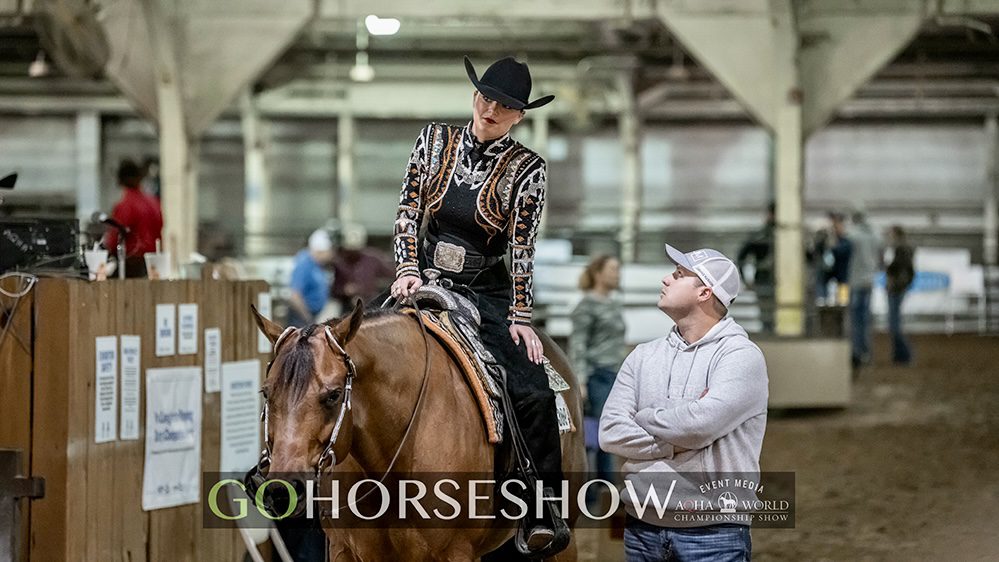When show season rolls around, it’s not uncommon for trainers and clients to spend more time together than either party spends with their family. That amount of close contact can weigh on a relationship.
To keep the wheels from falling off the horse show machine with all of its moving parts, it’s imperative that customers and trainers have a conversation to set or revisit boundaries that will maintain the relationship’s health and the team’s success.

That open and honest beginning conversation, as well as clear and caring communication throughout the year and duration of the relationship, will ensure every individual involved in the relationship – from trainers and assistants, to customers and even parents – know their roles and responsibilities.
“We want horse showing and learning to be fun and comfortable and there are times that those lines get blurred,” says Lynne Puthoff, “but communication is key. It can be very hard to have those private conversations, especially at a show, but it’s so very important to a happy, successful relationship.”
Puthoff makes an effort to meet with her customers at the start of each year, and when new customers come into the barn, allowing all involved to share goals and expectations for the relationship.
Training facilities and horse shows are busy places, so it sometimes happens that a person steps out of their lane in an effort to be helpful. Sometimes, that’s great; long time clients often know the routine and training program very well and can aid those starting out.
 But, there are some topics, Puthoff says, that need to remain the business of trainers and customers only, without the intervention of middle parties: which horse to buy, which class or classes to sign up for at the show, how to strategize a pattern (especially before the trainer and customer have met about it), and any concerns the customer may have with the trainer.
But, there are some topics, Puthoff says, that need to remain the business of trainers and customers only, without the intervention of middle parties: which horse to buy, which class or classes to sign up for at the show, how to strategize a pattern (especially before the trainer and customer have met about it), and any concerns the customer may have with the trainer.
“My biggest pet peeve is pot stirring. If a client has an issue, that person needs to come directly to the trainer. Together, we can then make a plan to correct it,” Puthoff says, explaining that small issues or questions could be directed to an assistant trainer, but anything that won’t have a mundane or clear cut response should go to the top.
Consider this list to ensure everyone stays in their own lanes:
- Ask permission – Horses require a lot of “stuff”. When someone’s favorite training bridle is missing in action and only 30 minutes remain in the warm up, it can be rightfully frustrating. So, be diligent about communicating what you may need and when.
- Show gratitude – No matter where you are in your progression toward goals, make sure to take the time to recognize the people who help you. A simple “thank you” goes a long way. Oh, and thank your horse, too.
- Be honest – There will undoubtedly be times where ideas and plans clash. Perhaps you’re not feeling confident enough yet to conquer western riding in the show pen, but your trainer is expecting you to ride it. Approach the conversation with honesty and a willingness to share what specifically is planting doubt in your mind. Perhaps you’re not sure exactly what you need to do differently when your trainer requests more leg for the millionth time. If you ask clear questions that come from a place of purity and problem solving no matter the topic, relationships, and outcomes, should only strengthen as barriers are broken down and mutual understanding is built up.
- Give space for autonomy – A bird doesn’t learn to fly without taking solo jumps from the nest. In fact, if someone held its wing each time it tried, that poor bird would never make it. Similarly, sometimes a person just needs to find their own legs to stand on. So, be brave and seek out opportunities for independence to challenge yourself or your horse.
- Give space in general – Horses are not a 9-5 job. And, though your trainer lives and breathes for his or her horses and clients, respect their time. Sending 15 texts at all hours of the day or showing up to the barn unannounced and expecting to be a priority is not realistic – some would even say rude. Remember that trainers, too, want down time and family time and maybe even a few days away (gasp!), just as you do. Give them a moment or two to breathe. When it comes to shows, keep in mind that everyone is enduring long, stressful and often hot days. It’s a recipe for emotions to run high, so whether at a show or not, Puthoff says, “Be sure that trainers and customers have sufficient space and time at the shows to rest their brains and refresh.”
- Take responsibility – Perhaps the hardest item on the list is to set aside pride and take responsibility. Whether it’s admitting when you’ve messed up or lending a hand in a chore that you’ve typically dipped out of (stacking hay, anyone?), taking responsibility does, in fact, and just as your parents always said, build character. Know what else it builds? Mutual respect.








